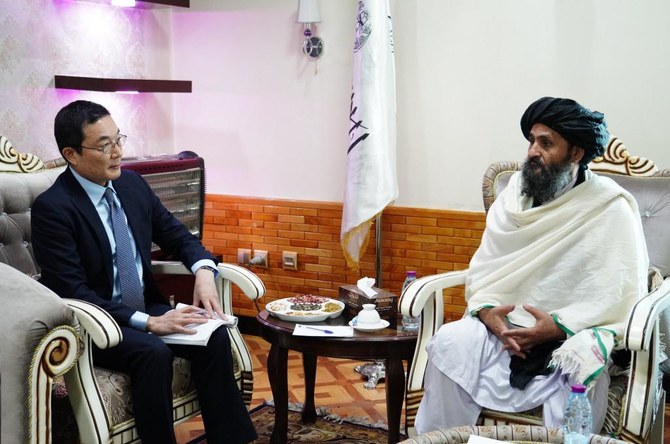SEOGWIPO, Jeju: On the southern coast of Jeju Island, far from the honeymoon resorts and tourist beaches, a modest home near a fishing village has quietly become a spiritual refuge for a largely invisible community: Muslim migrant workers.
Step past the shoe rack and the quiet hum of a record player, and you will find a small musalla. Clean, carpeted and softly lit, the space offers something rare for Muslims living on South Korea’s remote holiday island: a place to pray, rest, and feel recognized.
The prayer space was created by Nasir Hong-suk Seong, 35, a Korean fish farm operator who converted part of his home into a musalla after moving to Jeju earlier this year.
The island’s only masjid is in Jeju City, more than an hour by car from the southern coast where most migrants work in fisheries.
“Fish farm workers are on call 24 hours, so they can never make the time to go to the masjid for Jummah prayers,” Seong told Arab News.
“When I first arrived, I asked where they prayed. I was very sad when I heard it was almost impossible for them to attend Friday prayers and that they mostly prayed in the corner of their small dorm rooms.”
Often called the “Hawaii of South Korea,” Jeju is better known for its volcanic peak and tourist beaches than for labor migration. Yet, the island’s economy has been increasingly reliant on migrant workers, many of whom are Muslim men coming mainly from Indonesia, Pakistan and Sri Lanka.
Jeju Province officially recorded 3,567 migrant workers in 2024. Seong estimates that in his region alone, 300 fish farms employ about 1,500 of them, with half identifying as Muslim.
Seong moved to Jeju from the port city of Incheon, where he used to run a guesthouse and often hosted Muslim guests. Getting to know them helped him see through the negative stereotypes of Islam in the West, and in 2023 he converted to the Muslim faith.
“About 30 percent of my guests were from Muslim-majority countries. As I got to know them through hosting, they turned out to be incredibly kind and respectful,” he said.
“There are so many people who misunderstand the religion. I think when people talk about Islam in Korea, they think of something foreign, something unknown. But it can be as simple as taking care of your neighbors.”
Such, too, was the purpose of Seong’s musalla. He spent a month preparing it at the home belonging to his grandfather. Starting in March, he spent all his after-work hours furnishing the space.
“When I moved in, I had nothing. Not even furniture or a pillow. This musalla was the first thing I made,” he said.
“I always keep it open. People can come for group prayer anytime ... and seeing them pray here makes me happy.”
Modest but maintained with care, the musalla is fitted with prayer rugs lined on the floor. A low shelf holds editions of the Qur’an in English, Arabic and Korean. Arabic calligraphy decorates the walls. A handmade qibla sign marks the direction of prayer.
Khalid Hussein, a 38-year-old from Pakistan, has been working in Jeju for the past 15 years. Employed at Seong’s fish farm, he has been visiting the musalla regularly, also to be in touch more with his identity.
“It became easier for us,” Hussein said.
“Jeju is 100 percent different. The culture, religion — everything is different. So, we need to compromise.”
He was at the musalla with his colleague, Zahaid Hussain, who also came from Pakistan on a contract that brought him to Jeju.
“I felt good when I was finally able to offer Friday prayers,” Zahaid said. “I was happy.”


























